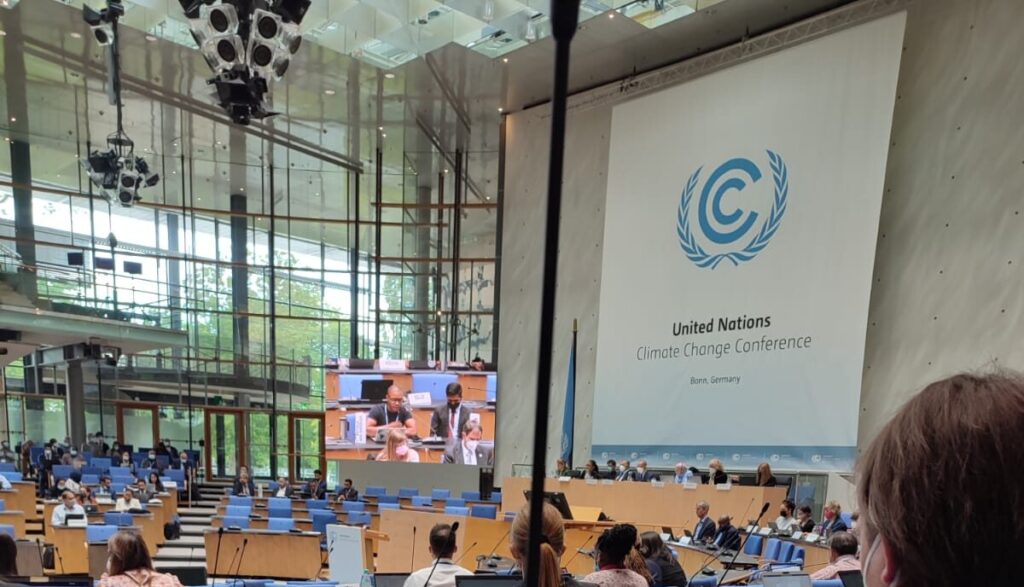We are a youth association from Germany that currently has a primarily white, academic, and privileged perspective on the climate crisis due to our backgrounds. We would like to continue working on becoming more inclusive and diverse.
Climate justice in the context of Global North and South
One of our main goals is to advocate for greater climate justice. (For a more detailed definition of climate justice, see here: Climate Justice And Environmental Justice — Black Earth Collective or here: Climate Justice — Greenpeace Kids.)
We are a German youth association and are therefore part of the Global North. So historically we belong to the main contributors of the climate crisis and its consequences. This results in a responsibility for us. People in the Global South, who have little or no responsibility for the climate crisis, are often the worst affected by its consequences. We see that we can only speak of and about climate justice to a limited extent because we are in the privileged position of the Global North and are less affected by the consequences of this injustice. Therefore, when it comes to climate justice, we see our role as listening to those most affected by the consequences of the climate crisis on the one hand, but on the other hand we also see it as our responsibility to create more space for voices and ideas from the Global South. The latter means that we have to actively take a back seat in certain situations. Additionally, we conclude from our responsibility that we want to show solidarity with and learn from climate activist and justice movements from the Global South. Above all, we would like to ensure that Germany accepts its historically-grown responsibility in climate mitigation and climate adaptation. Climate justice must be the guiding principle of all political measures related to the climate crisis.
And last, but all the more important for that, is that climate justice does not work without decolonization and anti-racism. In this context, we recognize that we unconsciously reproduce racism and live racist structures in our association. Therefore, we see our full responsibility in reflecting and working through these structures in order to avoid future racist behavior. In doing so, however, we also recognize that this is a never-ending process that we firmly embed in our association structures.
Climate justice in an intergenerational sense
In addition to the responsibility of the Global North in working for climate mitigation and adaptation, we also see intergenerational issues as an important area of our work. Young people will be affected longer and more than older generations. Therefore, they should also be heard more and participate in the decisions that will significantly shape their future.
In addition, we also try to address other social dimensions such as feminist and anti-capitalist perspectives in our work.
Our work also includes naming the climate crisis as part of multiple socio-ecological crises (e.g. biodiversity) and finding solutions that do not play the crises off against each other or reinforce them. We are also guided by the concept of sustainable development, which encompasses not only ecology, but also social and economic aspects.

Our role
In summary, we see ourselves as civil society actors who politically advocate for global and intergenerational climate justice and act as hinges between the demands from the street and the processes of politics to achieve permanent effective measures and structures. As an association from Germany, we mainly try to influence German decision makers and act primarily on the European and international level. Here we let our understanding of climate justice flow into the political discourse and emphasize the special historical responsibility of Germany. Based on this, we call for significantly stronger efforts in climate protection and adaptation at national and European level as well as special financial and technical support in the Global South.
We also see an educational mission as part of our role. In workshops and through our social media channels, we want to reach many other people and draw more attention to issues such as climate justice and youth participation in climate policy.
How we work
In our work, we want to be transparent internally and externally and bring many perspectives into the association through an inclusive atmosphere. We want to honestly accept other perspectives (than our own) and learn from our mistakes. We want to take responsibility and educate ourselves anti-racist and decolonial. We want to constantly question our projects, guidelines and structures. To review our work regularly, we consult BIPoC experts. We want to use our privileges more to give space to people from the Global South.
How do we develop our positions?
In developing climate policy positions, we are aware that we reproduce an understanding of knowledge from the Global North that is based on capitalism and colonialism. We want to reflect this critically on an ongoing basis by including external expert knowledge. The results of the Intergovernmental Panel on Climate Change (IPCC) are fundamental for us, but we also want to consider indigenous knowledge, experience reports and stories on the same level in the development of our positions.
Our self-understanding is part of a process of reflection. The former self-image can be found by clicking on the button. It does not reflect our current self-understanding anymore or only in parts.